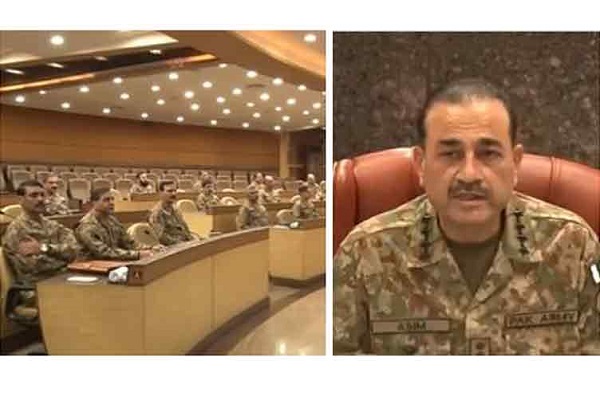WASHINGTON: The International Monetary Fund (IMF) has said that it’s still too early to determine whether ongoing discussions with
RAWALPINDI: Army stressed upon to adopt a “whole of the nation and whole of the government approach” to eradicate terrorism from the country. the army’s top brass on Friday reviewed domestic and regional security challenges, and
The resolve was expressed at the 257th Corps Commanders Conference held at the General Headquarters, which was chaired by Army Chief Gen Asim Munir.
According to a statement issued by the Inter-Services Public Relations (ISPR), the forum “affirmed that the military leadership is cognizant of the full spectrum of the challenges” and it resolved to “shoulder its constitutionally mandated responsibilities with support of the resilient people of Pakistan”.
The forum “reiterated the commitment of the armed forces to fully support national responses against internal & external threats”.
The ISPR said that the conference’s participants highlighted that “while the security forces are undertaking intelligence based operations in areas along western border, there was a need to adopt a whole of the nation and whole of the government approach to eradicate the menace of terrorism on long term basis.”
The focus of the conference, per the ISPR press release, was on the counter-terrorism campaign that has been approved by the government, with an emphasis on implementing it through a whole-of-system approach.
The participants agreed that “this approach would be key to eliminating the permissive factors of terrorism, extremism, and instability in the country.”
The forum expressed its assurance to pursue the goals set by the National Security Committee (NSC) to “turn the tide against terrorism through the coordinated application of all elements of national power”.
The conference was held following the army chief’s in-camera briefing to National Assembly members about the country’s security challenges on Friday.
During the briefing, the COAS had acknowledged that the strategy of engaging with terrorists had enabled them to regroup in the tribal areas.
The meeting was attended by the country’s political and military leaders who, in response, agreed to revisit the anti-terrorism strategy.
The forum reiterated the commitment of the armed forces to fully support national responses against internal and external threats.
In a clear shift from the policy of the previous regime, Friday’s in-camera sitting was told that a three-pronged plan — deter, dialogue and development — to root out terrorism was already underway, after lawmakers expressed serious concerns over the resurgence of terrorist groups.
The agreement came after the military leadership discussed recent acts of terrorism across the country and shared details of efforts being made by security forces aimed at eliminating terrorism, maintaining internal security and defending Pakistan from external threats.
The two-hour in-camera briefing contained updates about the country’s current security issues and the army’s anti-terror operations in Balochistan, Khyber Pakhtunkhwa, Punjab, Gilgit-Baltistan and other parts of the country.
During the briefing, Gen Munir also apprised parliamentarians about plans of the banned Tehreek-i-Taliban Pakistan (TTP) and security forces’ endeavours to counter them.
The director general of Inter-Services Intelligence, Lt Gen Nadeem Anjum in his briefing apprised lawmakers about the connivance of hostile intelligence agencies with terrorist groups.
According to sources said the army chief stressed the need for revisiting the anti-terrorism action plan and suggested a multi-dimensional or ‘3-D’ strategy.
According to the army chief, the ‘3-D’ plan is not a novel idea because it is consistent with state policy. He suggested including all stakeholders in this strategy such as security forces, legal fraternity, civil society, politicians, social workers, bureaucracy, diplomats and media.
Gen Munir also urged politicians to leave aside their differences. According to a lawmaker, the army said that instead of working for ‘new or old Pakistan’, politicians should unite for “our Pakistan”.
You May Also Like
JABALIA: Israeli forces battled Hamas fighters in the narrow alleyways of Jabalia in northern Gaza on Friday in some of the fiercest
KURRAM: Clashes on the border between Pakistan and Afghanistan escalated on Friday, prompting large-scale displacement from






